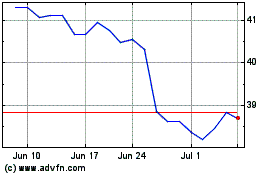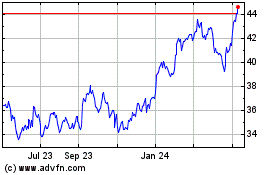GlaxoSmithKline Helped and Hurt by Sterling's Post-Brexit Fall
July 27 2016 - 11:15AM
Dow Jones News
By Denise Roland
LONDON--The sharp drop in the value of sterling triggered by
Britain's vote to leave the European Union both helped and hurt
GlaxoSmithKline PLC's second-quarter earnings, illustrating the
double-edged effect of the U.K.'s historic decision on corporate
results.
The company separately announced on Wednesday it would invest
GBP275 million ($302.1 million) to increase capacity at three of
its U.K. factories, which Chief Executive Andrew Witty said was a
vote of confidence in the face of the Brexit vote.
"The fundamental competitiveness of the U.K....remains exactly
the same today as it did before the referendum," Mr. Witty
said.
A weaker pound enhances Glaxo's financial results, as it reports
results in sterling but generates most of its revenue overseas.
That currency effect boosted core earnings per share by 21
percentage points and revenue by 7 percentage points in the second
quarter.
By the same token, a falling pound increases the value of
Glaxo's liabilities, forcing the company to take a GBP1.8 billion
write-down and post a net loss of GBP435 million.
Those liabilities include a put option held by Novartis AG
giving the Swiss drug giant the right to sell its stake in the
pair's jointly owned consumer-health-care business to Glaxo. With a
weaker pound, that stake is worth more, so it would cost Glaxo more
to acquire.
The sharp currency effects muddied an otherwise strong quarter
for Glaxo, which cheered investors by beating market expectations
on revenue and core profit, sending shares up 1.8%.
Core operating profit, a measure that strips out one-time losses
and gains, increased 36% to GBP1.8 billion, as revenue climbed 11%
to GBP6.5 billion, beating analyst forecasts of GBP1.6 billion and
GBP6.3 billion. Adjusting for currency effects, core operating
profit climbed 15% and revenue rose 4%.
Glaxo also narrowed its full-year guidance to the upper end of
earlier estimates. It now expects core earnings per share to
increase 11% to 12% in 2016, compared with 10% to 12% previously.
Mr. Witty said that adjustment reflected his "rock-solid"
confidence that the company could hit the top end of its
estimates.
Beyond the factory investment, Mr. Witty struck a further
sanguine note on the broader impact of the June 23 Brexit vote,
saying the company was "reasonably insulated" from any negative
effects.
The upbeat results suggest Glaxo is reaping the fruits of its
new structure after completing a $20 billion asset-swap deal with
Novartis early last year. The deal involved Glaxo trading its
cancer-drugs franchise for the Swiss company's vaccines business.
The U.K. drugmaker also took control of a joint venture that pooled
both companies' consumer-health-care businesses, which sell
drugstore staples such as toothpaste and painkillers.
The company said sales increased across all three divisions:
pharmaceuticals, vaccines and consumer health care. Its core
earnings growth reflected cost savings arising from the Novartis
transaction.
Glaxo backed earlier dividend guidance to say it expects to make
a full-year payout of 80 pence a share in 2016 and 2017.
Write to Denise Roland at Denise.Roland@wsj.com
(END) Dow Jones Newswires
July 27, 2016 11:00 ET (15:00 GMT)
Copyright (c) 2016 Dow Jones & Company, Inc.
GSK (NYSE:GSK)
Historical Stock Chart
From Mar 2024 to Apr 2024

GSK (NYSE:GSK)
Historical Stock Chart
From Apr 2023 to Apr 2024
